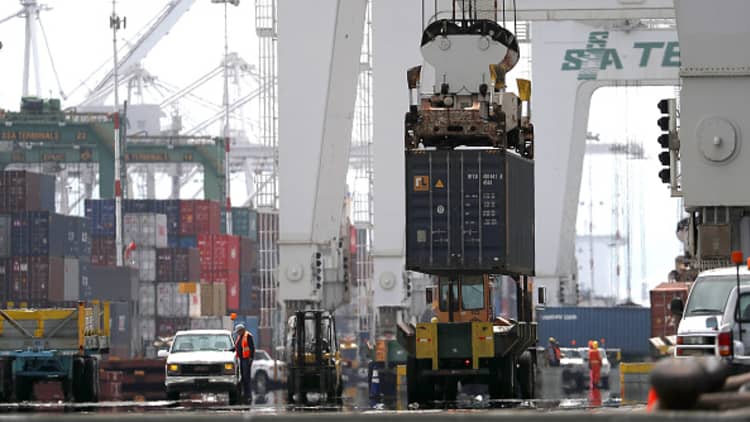The trade dispute between the U.S. and China has roiled markets off and on for weeks, but there isn't much clarity about when the battle becomes a full-blown war and how badly it will affect U.S. companies doing business around the globe.
China's Ministry of Commerce announced Friday it would place tariffs on U.S. goods, saying it was forced to respond to the "the largest trade war in economic history" when the U.S. slapped $34 billion in tariffs on Chinese goods.
The move, and counter measure, raise the stakes in a brewing conflict that puts U.S. manufacturers and farmers in the middle. But opinions vary on how severe the consequences will be for them and for the economy at large.
"Technically speaking, we are in a 'trade war' as we now have actual tariffs being imposed, with retaliatory responses," Michael Englund, the chief economist at Action Economics, told CNBC.
However, Englund said he agrees with CNBC's Jim Cramer and Eurasia Group CEO Ian Bremmer, who have said the effects of the tariffs imposed thus far have been greatly exaggerated. For example, they are not as far reaching or damaging as the tariffs imposed by a protectionist U.S. government at the beginning of the Great Depression. "It's not that bad," Cramer said on CNBC's Squawk on the Street on Friday.
Wells Fargo investment strategy analyst Peter Donisanu said in a client note published on Friday that "while the prospect of a trade war between the U.S. and China has increased, we nevertheless believe that the risks remain contained."

Both the U.S. and China will use rhetoric to put pressure on each other, "but the magnitude of this conflict is hardly dramatic in proportional terms," Englund said.
Where we are now
President Trump said in a March tweet that trade wars are "good, and easy to win."
National Economic Council Director Larry Kudlow defended Trump in April, saying the president is "ultimately a free trader" and using tariffs as leverage in negotiations, rather than an implementation of a protectionist policy. Since then, the White House has continued to escalate both rhetoric and tariffs against China, the European Union, Canada and Mexico.
Beijing and Washington had held several rounds of high-level talks since early May but the Trump administration declared it was considering putting tariffs on an expanded list of Chinese imports.
"The latest tariff threats demonstrates Trump’s frustration with the current state of negotiations with China, significantly increasing the likelihood that Trump will seek to use these investment restrictions in an attempt to bring China to the negotiating table," wealth management group Raymond James wrote on June 19.
Trump moved forward on Friday, putting U.S. tariffs on $34 billion worth of Chinese goods. China retaliated with tariffs on $34 billion of soybeans, pork and electric vehicles from the U.S. Trump is preparing to respond with an additional list of $200 billion worth of Chinese goods targeted for tariffs.
In the case of the European Union, Canada and Mexico, the U.S. has levied tariffs of 25 percent on steel and 10 percent on aluminum. Each nation responded with tariffs on billions worth of U.S. products: Mexico's tariffs took effect June 5, the EU's on June 29 and Canada's on July 1.
Trump has also threatened 20 percent tariffs on EU autos, and the trade bloc responded that it would place fresh tariffs against American made cars and auto parts if he does.
"These risks to remain contained so long as tariffs imposed by the U.S. are used as precisely targeted instruments of negotiation and not blunt tools of protectionism," Wells Fargo's Donisanu wrote. "Policymakers in Beijing have signaled their desire to avoid a trade war, yet are willing to respond to tariffs and restrictive policies in a one-for-one, like kind manner."
The Tariff Act of 1930, otherwise known as the Smoot-Hawley Tariff, is one of the most infamous examples of protectionist trade policies. As the global economy sank into the Great Depression, Congress added a nearly 50 percent increase to tariffs on imports. Trading partners of the U.S. retaliated in kind, hitting exports hard and creating "longer-lasting negative effects" to the economy, Deutsche Bank said.
Where we are going
Donisanu and Englund both say today's environment continues to be one centered on negotiation, rather than an all-out trade war. But a resolution is not likely to happen quickly or smoothly.
China’s desire to maintain a strong presence in the face of heightened rhetoric from the U.S. on trade issues "could prevent a quick resolution given the current circumstance," Donisanu said.
"Prices will be paid from some companies along the way as tariffs make supply chains more costly, forcing companies to operate at a loss for a period while the conflict is resolved," Englund said.
Investment bank B. Riley analysts said the largest overhanging issue is the attempt by the World Trade Organization to referee an intellectual property dispute between China and the U.S., which B. Riley says is "not poised to be resolved anytime soon."
In the meantime, U.S. exporters facing higher tariffs in China will have a tough choice. They can either take a profit hit, or try to pass along the higher cost to Chinese consumers, thus making their products less competitive.
The longer the scenario continues, the more "tit far tat tariffs will likely generate more volatility in financial markets," Atsi Sheth, a Moody's managing director, said Friday. "If they also weaken consumer sentiment and moderate corporate investment in the US and elsewhere, the second order impact of tariff increases would be to dampen currently robust global growth momentum.”


